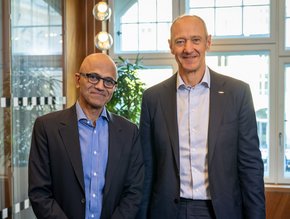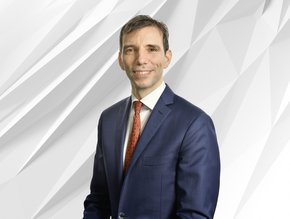Five Minutes With: Björn Dufwenberg, MD at Strat7 Advisory

Tell us a little bit about yourself and your career so far
I’ve been involved in management consulting, innovation strategy and corporate strategy for 18 years, mainly working in Stockholm, but with stints in Tokyo and Munich. During this time, I've been involved in everything from the hyper-rational analysis of management consulting to creatively-driven problem solving in agencies.
Before joining STRAT7, I headed the customer-led transformation practice at PwC Sweden, where my primary focus was helping companies become more customer-focused. Prior to that, I was a partner at an innovation strategy agency called Pond, which we eventually sold to PwC.
How would you describe STRAT7 and its main activities?
I lead the STRAT7 Advisory team and help clients define strategies that will allow them to anticipate and adapt to changing customer needs, behaviours and preferences. We draw on the specialist data and analytics skills held in the agencies across the STRAT7 group to deliver on the consultancy.
What does your role as Managing Director of STRAT7 Advisory involve on a daily basis?
At its core, my role involves a lot of collaboration. I spend a good chunk of my time working with senior leadership to figure out where we're headed next, whether that's developing new capabilities or even considering potential acquisitions.
Then there's my team – the heart of STRAT7 Advisory. I'm hands-on in ensuring they're growing, learning and evolving in their roles.
And, of course, I'm constantly in touch with our clients. Sometimes it's about understanding what they're grappling with; at other times it's diving in deep alongside them to find a solution.
Why is establishing a 'sensory system' so important in detecting market changes? And how can emerging technologies help to create this system?
Recognising and responding to change – which, as a pandemic and the rise of AI shows, can happen extremely quickly and with enormous impact - requires businesses to have a radar that constantly detects market and customer shifts.
Despite tools being available to aid in this, many businesses aren't fully leveraging their capabilities.
Technologies such as machine learning and predictive analytics stand out, but by no means are they the only important ones. They provide the capability to discern patterns and trends that could give a business a competitive edge and make them more able to adapt to changing customer preferences. For example, consider the potential of analysing huge amounts of unstructured data, like customer emails, call centre logs or social media posts, and extracting critical insights pointing towards emerging market trends.
By incorporating predictive analytics into their strategic framework, companies not only gain some foresight but also the ability to craft proactive measures. This approach enables them to navigate potential challenges and seize any opportunities arising.
Ultimately, with the right use of technology, businesses can ensure they remain aligned with, if not ahead of, ever-changing market dynamics and customer needs.
How must traditional leadership roles change to match the evolving dynamics of today's markets?
This is an interesting question. Research shows 98% of CEOs are considering an overhaul of their business model. However, there's a shared concern that many aren't adapting quickly enough – that they lack the agility to deal with change.
Part of the solution is to rethink leadership roles. While introducing new roles like a Chief Change Officer might signify a company's commitment to adaptability, real change demands a more united front from existing roles. CEOs, CFOs and CMOs in particular need to collaborate more closely to build out the ability of the organisation to be agile.
There's also the core of the company to consider: its culture. Embracing a culture that's open to experimentation, values new ideas and continuously seeks learning is essential, and it must be initiated from the top.
When this is done right, businesses can better steer through market uncertainties, spot opportunities and ensure consistent growth. It's all about staying adaptable and resilient in our fast-paced world, but it does require a shift in focus from the C-Suite.
What new roles can you foresee being created to drive future change in business?
Chief Change Officers can have a place spearheading transformation, but at the top of an organisation it’s not necessarily about new roles. Instead, it's often about redefining existing ones, with a shift in focus to make businesses more adaptive.
That said, there are other roles to consider, particularly those linked to data and human understanding and their effective application. The world will certainly need more data scientists as well as consumer anthropologists, and the important thing is they’ll need to work very closely together.
What are your personal goals for the next 12 months?
Outside of work, I love swimrunning, a unique sporting combination that involves making your way from island to island, originally in the Swedish archipelago. The distances vary, but the longest I usually undertake involves running 21km and swimming 2km. It’s very empowering to know you can just jump in the water and swim to that island you see on the horizon, and then run across it!
Now, I’m ready for the next step, and in 2024 I’ll attempt my first Ironman Triathlon. I like the challenge of going the distance and testing myself, and I even find elements quite meditative. It all certainly helps balance me out for the day job.
What's the best piece of advice you've ever received?
I’ve picked up lots of great advice, but the most enduring and universal is quite simple: it’s better to be roughly right than exactly wrong. It’s a mantra I learned from one of the founders of Pond and emphasises the importance of doing and not overthinking, and how to think about direction and insight in decision-making.
- Leadership development remains critical to successLeadership & Strategy
- Businesses 'running blind' in the fight against cyber crimeDigital Strategy
- Building bridges between management and productivityLeadership & Strategy
- How analogous inspiration can solve your strategic deadlockLeadership & Strategy






